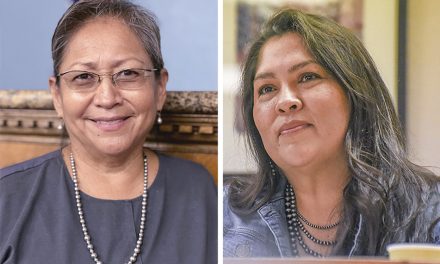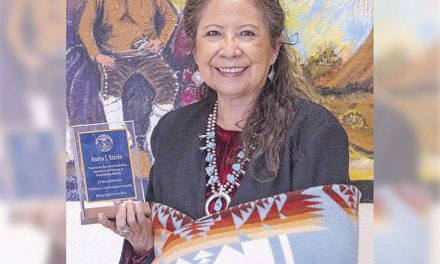
Letters: A chance to embrace clean, renewable energy
With the major coal-fired power plant and coal mine in Arizona now closed, our state has the opportunity to embrace clean, renewable energy.
More importantly, the state has the opportunity to forge a new partnership with tribal nations whose resources have been used to provide cheap power and water to growth in Arizona.
The question burning before us is whether or not the Navajo and Hopi nations will see real benefits from this progress, which was won after decades of the exploitation of our water and air.
With climate change growing worse, Arizonans clearly understand the critical need to take care of our planet like never before.
As a longtime advocate for the protection and restoration of our water, land, and air in the Navajo and Hopi ancestral indigenous territory, I am relieved to see this change. I am also relieved that the Arizona Corporation Commission voted recently to support our communities and include us in the new clean energy economy when it passed 3-2 a new clean Energy Rules package.
If Congress can also pass the Build Back Better Plan offered by President Biden, then we will have the critical backing and support needed to move toward a just and equitable transition.
Let me explain how we got here and what needs to happen next.
Communities like ours have been severely impacted by coal. For decades the Southwest has had reliable power, air conditioning, heat, and water in large part due to sacrifices made by tribal communities in Arizona. Black Mesa, the Navajo Nation community that my family has called home for centuries, is one of those.
The coal mine pumped our water from the ground in order to operate at a rate of more than three million gallons per day. Peabody operated two mines since the 1970s — Black Mesa Mine and Kayenta Mine.
Coal from Black Mesa Mine was dedicated to Mohave Generating Station operated by majority owner Southern California Edison until 2005, when demands to stop using groundwater for the slurry line, ended the operation.
The coal from Kayenta Mine was dedicated to the former Navajo Generating Station some 90 miles away in the northwestern corner of the reservation. Navajo Generating Station was, until its demolition in December, the largest coal plant in the Western United States.
Power from that plant was used to move water from the Colorado River to homes all over metropolitan Phoenix over the past 50 years. And power from that plant cooled homes and buildings in Phoenix and Tucson, hundreds of miles away.
The mine and the station provided our Navajo Nation residents with good-paying jobs that may have otherwise been unavailable to us.
Along with the jobs, the power plant and coal mine gave the region an economic boost, but the operation also came with significant environmental and public health costs that have had an impact on Black Mesa and the surrounding communities so severe we will see this damage for years to come.
Many suffer from asthma and other respiratory ailments. The air and water are still polluted.
Our sacrifice is responsible for providing Central and Southern Arizona with electricity and water, but many of us are unable to obtain those benefits.
Thousands of acres of Black Mesa have been completely destroyed. Our sacred lands are contaminated by polluted mine waste and heavy metals.
Most importantly our aquifers have been severely drawn down due to mining. Our region sees less and less precipitation due to climate change.
We created our organization, Tó Nizhóní Ání, which means, “sacred water speaks,” to stop the pumping of our groundwater supply and protect the water from the aquifers for the future of Black Mesa.
As the coal economy fades, my hope is that we are able to successfully proceed with a just and equitable transition to the clean energy economy.
I am optimistic that the investments in Biden’s Build Back Better Plan is an appropriate first step to allow our land to heal from decades of abuse. There are many ways this can happen: clean up and reclamation of mined land and water, new jobs at solar plants, electrification of Native communities, new water infrastructure to ensure reliable clean water, and broadband Internet access.
There are so many communities impacted by coal plant closures. If we act now we can prepare for and meet the economic challenges coming. If we don’t, each coal plant closure will send impacted communities into economic devastation and struggling for years to come.
The Navajo Nation was told we had less than one year of employment and operation left before NGS would close. This should not happen to any community. I urge all of Arizona’s federal representatives to vote for a meaningful bill that will honor the sacrifices made by Navajo and Hopi communities.
Nicole Horseherder
Director, Tó Nizhóní Ání
Black Mesa, Ariz.
Stop alcohol sales at Dead Horse, Smith Lake
Hello, my Navajo people. This is a problem we, as a tribe, have to fight and win.
There are two gas stations that stopped selling gas and are selling alcohol at the rez border, which have caused a lot of deaths of innocent people and those that are addicted to alcohol.
One is at Dead Horse and the other is at Smith Lake. These two places need to close and stop selling at our rez border.
I don’t like alcohol at all. I hate what destruction it has done to my family. It has taken people I love away.
I know how hard it is to battle the bottle because I have and I’m still alive and sober while all my party buddies from my youth are dead in the ground or dying from some health issues.
I know I will piss off a lot of people who use alcohol and even my own family, but I stand by my words. If you’re Navajo and drink alcohol, you’re nothing but a “white man’s b****.”
These two places need to close and get a business that helps Navajos get ahead, not dead.
Richard Anderson Jr.
Gallup, N.M.







 Highway 264,
Highway 264, I-40, WB @ Winslow
I-40, WB @ Winslow